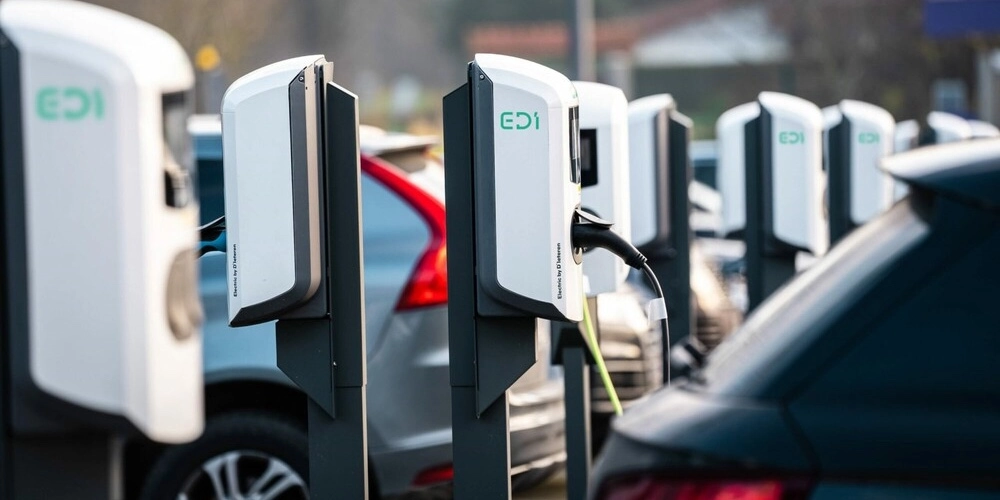According to the European Automobile Manufacturers’ Association (ACEA), in March, 9,459 battery electric vehicles (BEVs) were registered in Belgium, representing a 23.8 per cent increase compared to 2023.
Meanwhile, across the entire European Union (EU), registrations decreased by 11.3 per cent to 134,397 units, a 13.9 per cent market share decline compared to last year.
The association indicates that this “reflects the overall market slowdown,” although it highlights Belgium and France as the two countries that showed a double-digit increase.
Part of this reduction is also due to the Easter holidays, which represented two fewer days of production compared to the same period in 2023.
However, in the first quarter of this year, Belgium demonstrated a considerable increase in the entire electrified market.
According to the Federation of Automobile Manufacturers (FEBIAC), the market share of electric and hybrid vehicles in the first quarter of 2024 was 52.8 per cent.
Only 100 per cent electric cars, in particular, showed a significant increase from 5.9 per cent to 23 per cent of all newly registered cars.
The two regions with the highest sales are Brussels, at 58.4 per cent, and Flanders, at 54.9 per cent, while results in Wallonia remained stable.
The Belgian market remains highly focused on company cars, which account for 60.2 per cent of new vehicles.

Naomi Cambien, a Policy expert in transportation at Bond Beter Leefmilieu (BBL), points out to Mobility Portal Europe in an interview analyzing the country’s upcoming federal elections:
“We have (unfortunately) a huge company car fleet, so this pushes electrification a lot,” she asserts.
However, with government subsidies, such as the 5,000 euros grant in Flanders, electric cars are also becoming increasingly attractive to individuals.
In a dialogue with Mobility Portal Europe, Sander Hereijgers, CEO of Pluginvest, highlights: “Belgium has always been a bit behind compared to pioneers like the Netherlands and Norway, but 2023 was really a turning point.”

Thus, Belgium ended last year with 93,285 BEV sales, with very little difference from the 113,981 registered in the Netherlands and the 104,587 in Norway.
“In a 12-month period, we registered as many fully electric cars as in the last ten years,” Hereijgers adds.
Not only that, but the country also stands out in the growth of its charging stations, showing a significant increase in the number of fast chargers (CC) in 2023 by 275 per cent.
“Belgium is in the top 3 in Europe in terms of the number of fast chargers per electric vehicle,” Pluginvest reports in a LinkedIn post.
The country has approximately 2,505 fast charging points, equivalent to 64.32 electric vehicles per fast charger, even better than its northern neighbors (116).
“With the government’s ambitious plans to install fast chargers every 25 kilometers along major roads, we could become the leader in Europe,” the company adds.
This significant advance in the transition to electric mobility brings with it a growing concern regarding network congestion, similar to what the Netherlands is already facing.
In this regard, during a virtual event organized by Mobility Portal Europe, Evan Costagliola, Senior Principal at Cityfi, stated: “The Netherlands is somewhat a victim of its own success.”
This refers to the fact that its large and rapid adoption of electromobility did not initially consider that the network’s capacity might not be sufficient to cover that demand if not prepared.
Taking this into account, Belgium is taking action to avoid repeating the same scenario.
Elia, the Belgian high-voltage grid operator, published the accommodation capacity map showing potential congestion issues in certain areas in 2025 or 2032.

Regarding this, David Zenner, Head of Customer Service, said to local media: “Overall, we can meet current demands.”
However, he points out: “In some areas, we are reaching the limit.”
“Today we have to tell new and existing industrial actors in some areas to move to other locations for the first four or five years,” he adds.
Despite this, Elia views the future optimistically thanks to a significant investment plan that should create more space in the grid by 2030-2032.
This is based, among other things, on all requests and plans from the sector, including electric cars.
“If EVs are charged intelligently, they can be part of the solution,” Zenner affirms.








